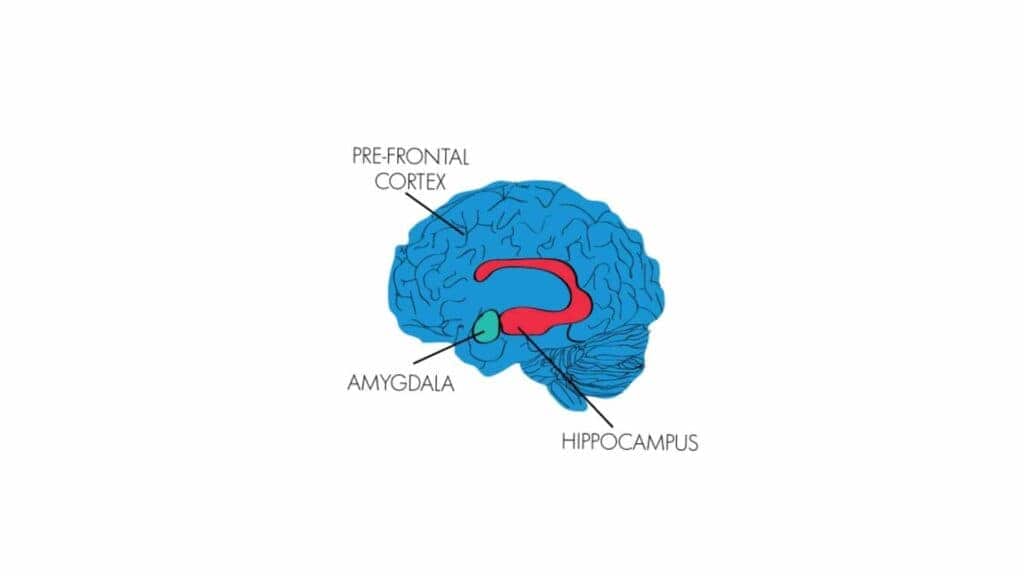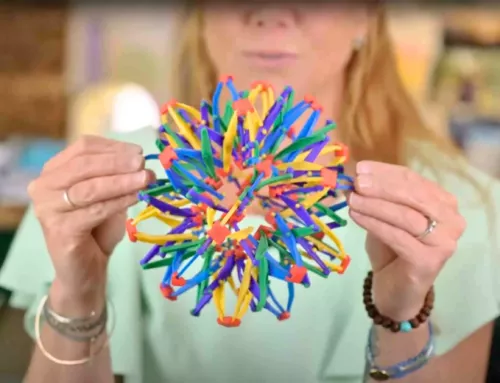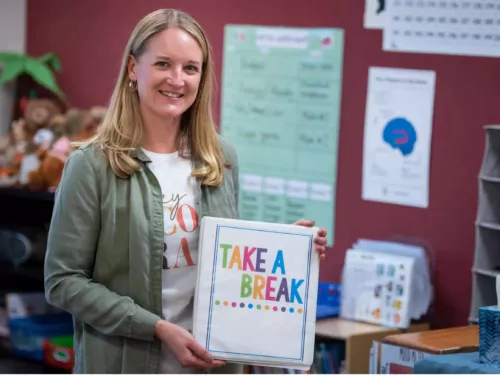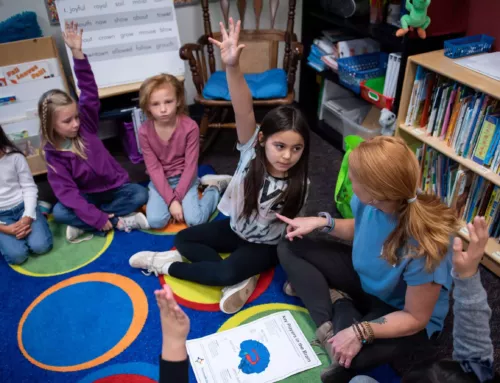We love teaching children about their brains and how to be in charge of them. When kids understand how their brain works and how to be in charge of theirs, they are empowered to take responsibility for themselves. One of the most important parts of the brain to learn about is the prefrontal cortex. This part of our brain is responsible for executive skills like focus, problem solving, learning, and higher-order thinking.
This lesson will walk you through teaching children about the prefrontal cortex, step-by-step.
Duration: 30 minutes
Materials: Wise Owl puppet, breathing ball, glitter jar, mindful coloring sheets, gel pens
Lesson Activities: Settle Your Glitter, Chime, Mindful Coloring, Read Little Monkey Calms Down
Link to Video: Settle Your Glitter
Download: English PDF / Español PDF
How To Teach It
Step 1 – Open With a Brain Break
Open with a brain break. “Before we can learn about our brain, we have to get our brain ready.”
Begin by introducing the chime if you have not already (Here’s how to do a brain break). Start off with the chime. Hands on belly or other anchor spot (heart, lap, knees). Listen to the chime consecutively from one time to three times depending on the student’s needs for getting regulated.
Use this short time to help students get their brains and bodies ready for learning. Maybe say “Before we can learn about our brain, we have to get our brain ready.”
Step 2 – Introduce Miss Elephante
A key part of this lesson is engaging the class by having the puppets do the talking. This can feel silly or uncomfortable at first but it is necessary for engaging the class and integrating the information.
Spend a few moments doing a short review of Guard Dog (amygdala) and Ms. Elephante (hippocampus).
Here’s the dialogue you can use:
- “Today we are going to learn about the third key player in our brain.”
Get Wise Owl puppet out and remind the kids that owls are very quiet and shy animals. Talk in a very calm and quiet voice.This will engage the class with the Wise Owl puppet. You can walk around the class and let students pet Wise Owl’s head if they are very calm and still. You can then begin to talk about Wise Owl’s job in their brain using Wise Owl as the teacher.
- They like it when everyone around them is very still.
- “I (Wise Owl) represent one of the key parts of your brain that you use every day.”
- Make Wise Owl quiet, be very serious and calm. Have him be focused, and move its head around to take in everything.
- “My job is to be focused so you can do your best learning. I also help you solve problems, be responsible and all of the other important things you need to do to be smart.”
- “Now you know my name – What is it?!” Kids say in a whisper voice “Wise Owl”
- “Scientists have a really special, really long word that they call me. Are you guys scientists? Because if you are, I better tell you my science name. Are you ready?”
- “Scientists call me the prefrontal cortex. Repeat after me (5 times) ‘pre (pause) frontal (pause) cortex.’ My nickname is PFC. Repeat. My brain’s job is to learn, solve problems, and help you understand what you are feeling. It’s a big job since you will be learning for the rest of your life. I get bigger as you get older and grow up when you are 25 years old.”
- “Well, Wise Owl, I’m not sure I can remember that big scientific name. Wise Owl, how do your scientist friends remember that big name?”
- Have Wise Owl look at you for a long time… and you can say, “What? It’s a big name!” and Wise Owl says, “Okay, it is tricky. There’s a secret chant. Are you ready for it? P-F-C (hold up fingers to count each letter), follow me (make Wise Owl look around)! I’ll make you smart (put a hand on your forehead)!”

Want More Calm & Connection in Your Classroom?
Foster more calm in yourself, your students, and your classroom with this FocusedKids brain-based emotional learning workshop.
Step 3 – Closing With Gratitude
Create a closing routine with your class around gratitude. We know that when children practice thinking about what they are grateful for it wires their brains to be happier, calmer, and less stressed.
For this activity, maybe have children say one thing they are grateful wise owl can help them do.
Keys to Success
Vocabulary
Wise Owl, prefrontal cortex, PFC, calm, focus, breathing ball, deep breaths, slow, relaxed, thinking, problem-solving
Make it a Habit
- Catch kids using Wise Owl.
- Example: “I see Judy is using her Wise Owl to get ready for math.”
- Example: “I see Jose is using his wise owl to get everything put away and ready to line up for lunch.”
- Bring out Wise Owl during times of focus, transition, and other times in the day when students should be getting focused, getting organized, being responsible, etc.
Practice it
- Make a Wise Owl puppet. Hold up Wise Owl when you see students showing executive functioning skills.
- Form class groups that could earn “Wise Owl” points. Every time kids use Wise Owl their group gets a point.
- Listen to the Chime.
- Use the breathing ball as a tool to guide deep breaths during a brain break.
Send it Home
We learned about Wise Owl this week! Wise Owl helps us remember things, solve problems, and be flexible. Wise Owl is important for learning. Ask your kiddos how they have been using their wise owls. Make your own with the coloring page and popsicle stick sent home. Try to catch your kiddos using their wise owl at home and watch their problem-solving skills grow! Send home description for parents about the 3 key play
Brain Science
Your prefrontal cortex is 80 percent developed at age three and not fully developed until your mid-twenties! So you need a lot of support and experiences to help build this part of your brain.

Download Key Players in the Brain PDF
Recommended Books
Recommended Websites
Make It Your Own
Once you have the basics of being Miss Elephante down, start to explore situations in which Wise Owl might show up. This can help get students become more aware of times their very own Wise Owl is trying to help them out.

FocusedKids Online Educator Workshops
Want to go deeper? Find out how you can bring more calm and connection to your school or classroom with the FocusedKids Method



